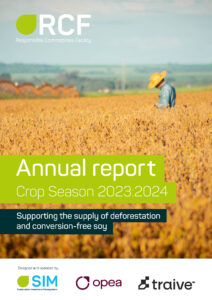RCF contributes over 180,000 tonnes of vDCF soy in its second year
The environmental impact of the second year of the Responsible Commodities Facility Cerrado Programme has been calculated, independently verified and published in the 2023-2024 Annual Report. 
The programme scaled more than four-fold from its first year, and the amount invested expanded to US$47 million through an innovative blended finance structure bringing three more investors onboard – Santander Brasil, Rabobank and AGRI3 joined UK supermarkets Tesco, Sainsbury’s and Waitrose. As a result, the number of participating farms increased from 32 to 122, significantly increasing the environmental impact of the programme.
The programme delivered 180,221 tonnes of verified deforestation and conversion free soy into the supply chain from the participating farms, all located in the Cerrado region of Brazil. This resulted in 43,324 ha of native vegetation being conserved, of which 11,346 ha is in excess of the legal reserve requirement (ca. 10% of total area, double the initial target), and 18.2 MtCO2 carbon stocks were protected in native vegetation (more than 15% of annual carbon dioxide emissions in the UK).
The participating landowners committed to forgo their right to legally convert the remaining vegetation in their farms, and adhere to other social and environmental requirements, as defined in RCF’s Eligibility Criteria, in order to participate in the programme. The farms were then able to benefit from a low interest loan distributed from the fund. The initiative is financed through a first of its kind approach: dollar-denominated green bonds (CRAs – Certificates of Receivables from the Agribusiness) registered in the Vienna Bourse and B3 Brazilian Stock Exchange.
Earlier this year, the Green CRAs issued to capitalise the RCF obtained a Second Party Opinion (SPO) from environmental advisory firm ERM-NINT concluding that the RCF’s Cerrado Programme is in alignment with both the Green Bond Principles (GBP) of the International Capital Market Association (ICMA), and the Green Loan Principles (GLP).
This crop season was a particularly difficult period for agriculture across the world, and in particular in Brazil. The changing climate, exacerbated by El Niño, has resulted in more severe heat and lower precipitation than normal in the Cerrado region. The reduced and delayed rainfall and very hot conditions have forced some farmers to plant late or replant their crops, reducing soy yields for some Brazilian farmers by up to 40% in relation to previous years. In spite of these challenges, the RCF managed to minimise negative financial impacts, while creating significant environmental impacts.
In order to improve its transparency, the environmental obligations and impacts were monitored by the teams at Sustainable Investment Management (SIM) and BVRio, and independently verified by ERM-NINT.
The methodologies used for impact quantification and monitoring reports were reviewed by the new Environmental Advisory Board comprising; Greg Fishbein (The Nature Conservancy), Ivo Mulder/Martin Hallé (UN Environment Programme), Lilian Vendrametto (Conservation International), Fabrício de Campos (Sustainable Finance expert), Isabella Freire Vitali/Jane Lino (Proforest), André Guimarães (IPAM), and Beto Mesquita (BVRio – secretariat).
SIM Director, Pedro Moura Costa, commented, “The programme was rapidly scaled-up for its second year, with over four times more funding made available. It delivered greater environmental protection to the Cerrado, at the same time as contributing more DCF soy into supply chains.”
Member of the RCF Environmental Advisory Board, Greg Fishbein, The Nature Conservancy, Director of Agriculture Finance, said of the initiative, “RCF will create tangible climate and biodiversity impacts by offering farmers who can legally clear their forests a clear financial incentive not to do so. This is exactly the type of mechanism we envisioned when we created IFACC – one that can leverage commercial finance to support farmers in their transition to climate-friendly production models.”
The Cerrado Programme now rolls forward to its third year, and operators, SIM, continue to explore blended finance models in order to scale the fund to USD 200 million in 2025.

